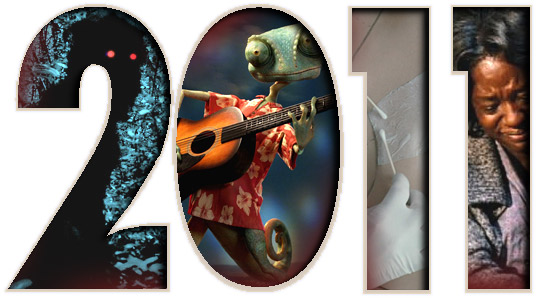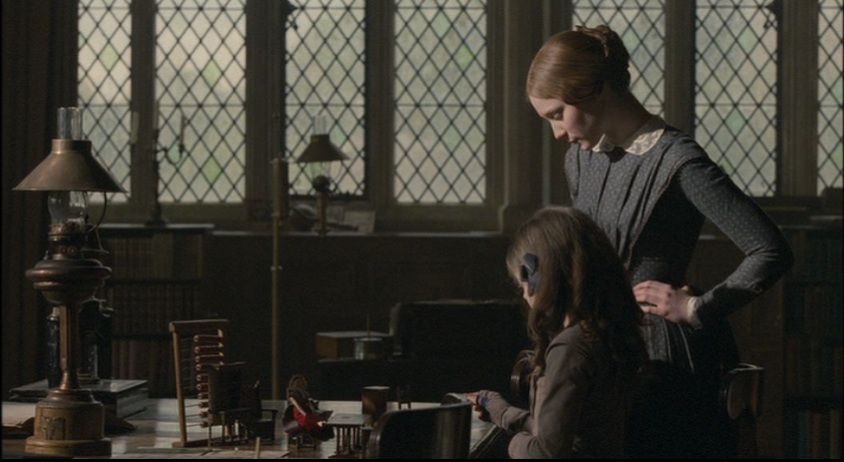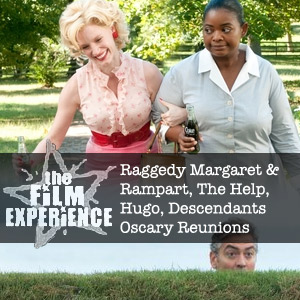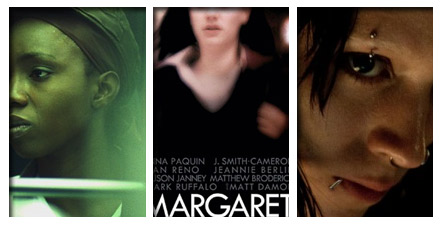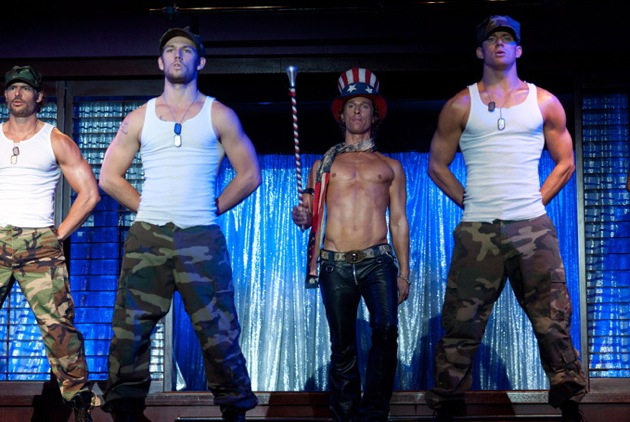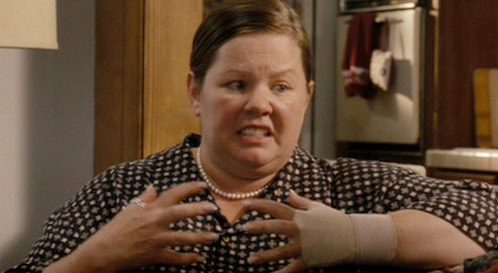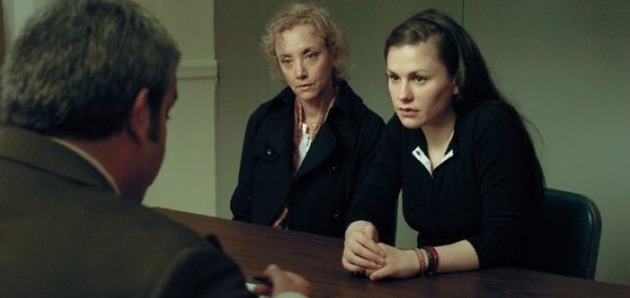Oscar Symposium Day 2: Invisible Art & Self Love
 Thursday, February 2, 2012 at 10:00PM
Thursday, February 2, 2012 at 10:00PM Previously on the Oscar Symposium... we discussed and defined the business of actors elevating their movies, spent time at "Tinker Tailor Soldier Spy"'s stale office party mingling with the nine Best Picture nominees (only one of which we all seem to love) and agreed that Brad Pitt deserves Best Actor. Eventually Nathaniel's second favorite movie of the year (The Artist) took quite a beating so he sulked off to lick his wounds.
And here we pick up for Day Two of our three day symposium...
 MARK HARRIS: While we're waiting for our host... Nick raised a really interesting point yesterday in his persuasive case for Plummer, which is: Just what the hell is a supporting performance anyway? I like his definition (and Plummer would probably get my vote too, for showing amazing restraint in a part that could be played as one Big Moment after another). But I'm also drawn to performances like Jonah Hill's, in a role that exists purely to give Pitt's character a wittily contrasting somebody to bounce off of, and like Melissa McCarthy's (my favorite in that category, I'm not ashamed to admit), even though she's more a standout in an ensemble than a pure supporting actress. Do any of you feel that there are supporting performances this year that are miscategorized? The French clearly do, since when the Cesars nominated Berenice Bejo for The Artist, it was for Best Actress.
MARK HARRIS: While we're waiting for our host... Nick raised a really interesting point yesterday in his persuasive case for Plummer, which is: Just what the hell is a supporting performance anyway? I like his definition (and Plummer would probably get my vote too, for showing amazing restraint in a part that could be played as one Big Moment after another). But I'm also drawn to performances like Jonah Hill's, in a role that exists purely to give Pitt's character a wittily contrasting somebody to bounce off of, and like Melissa McCarthy's (my favorite in that category, I'm not ashamed to admit), even though she's more a standout in an ensemble than a pure supporting actress. Do any of you feel that there are supporting performances this year that are miscategorized? The French clearly do, since when the Cesars nominated Berenice Bejo for The Artist, it was for Best Actress.
NATHANIEL ROGERS: I plead the fifth on category fraud. I've said too much over the years about that whole... nightmare.
 KURT OSENLUND: I'm going to flip it on its head and go 'lead to supporting.' By which I mean, I think I'm one of the few who still believes Viola Davis belongs in the supporting category. I'll admit this is a complicated stance. I think it's the film/text that's guilty of cheaply attempting to make Aibileen a lead character, giving her a tacked-on coda of "closure" and trying to reduce the shame of taking a black women's story and still handing it, mainstream-style, to a white redhead. By extension, I think awards bodies are guilty for taking the bait. Ideally, I'd like to see Meryl walk away with Best Actress, Viola walk away with Supporting Actress, and Octavia sit comfortably with a nomination, for a performance that's highly enjoyable, but shrill and stereotypical and nowhere near as soulful as her co-star's.
KURT OSENLUND: I'm going to flip it on its head and go 'lead to supporting.' By which I mean, I think I'm one of the few who still believes Viola Davis belongs in the supporting category. I'll admit this is a complicated stance. I think it's the film/text that's guilty of cheaply attempting to make Aibileen a lead character, giving her a tacked-on coda of "closure" and trying to reduce the shame of taking a black women's story and still handing it, mainstream-style, to a white redhead. By extension, I think awards bodies are guilty for taking the bait. Ideally, I'd like to see Meryl walk away with Best Actress, Viola walk away with Supporting Actress, and Octavia sit comfortably with a nomination, for a performance that's highly enjoyable, but shrill and stereotypical and nowhere near as soulful as her co-star's.
My short answer to the 'supporting to lead' question would be that, this year, I actually think all of the supporting stars are placed where they belong.
 NICK DAVIS: I don't think the ending of The Help feels tacked on. I don't even think it feels like closure: we have no way to predict Aibileen's next move, much less to presume its ease. And from those opening minutes with all of her backstory and daily routine, and through all of Davis's impeccable playing of heavily weighted scenes, I think she's definitely a lead. I know her screen time must be small compared to other leads, but at the very least, she falls squarely in that Marge Gunderson/Hannibal Lecter category where her charismatic impress is so profound from the lead/supporting borderline that it pushes her handily over. It helps that even the blocking and costuming and editing and lighting choices keep conspiring to shift focus from Skeeter to Aibileen whenever they share a scene. Emma Stone is just giving away those scenes, as markedly as Meryl all but erased herself in the Doubt standoff. I wouldn't want anyone watching me act opposite Viola Davis, either.
NICK DAVIS: I don't think the ending of The Help feels tacked on. I don't even think it feels like closure: we have no way to predict Aibileen's next move, much less to presume its ease. And from those opening minutes with all of her backstory and daily routine, and through all of Davis's impeccable playing of heavily weighted scenes, I think she's definitely a lead. I know her screen time must be small compared to other leads, but at the very least, she falls squarely in that Marge Gunderson/Hannibal Lecter category where her charismatic impress is so profound from the lead/supporting borderline that it pushes her handily over. It helps that even the blocking and costuming and editing and lighting choices keep conspiring to shift focus from Skeeter to Aibileen whenever they share a scene. Emma Stone is just giving away those scenes, as markedly as Meryl all but erased herself in the Doubt standoff. I wouldn't want anyone watching me act opposite Viola Davis, either.
MARK: At last, a fight! I'm going to strongly disagree about Viola Davis, who not only carries the emotional weight of The Help, but has considerably more screen time than past lead-performance winners like Frances McDormand in Fargo. Kathryn Stockett's novel isn't Skeeter's story, even if Skeeter is a storyteller -- it's told from the first-person perspectives of Skeeter, Aibileen, and Minny. (So, if the movie were really true to the book, Octavia Spencer would probably have to be considered a third co-lead.) To me, Skeeter's "...and then I wrote the book" storyline feels as inorganic to what The Help is really about as the closure the movie gives Davis. The movie's emotional strength -- what there is of it -- lives in Aibileen's struggle; she's arguably even the title character. Yes, the movie is technically Skeeter's story, but only in the way that Training Day is technically Ethan Hawke's. So I'm happy Davis is where she is.
After the jump: The Help, Best Screenplay, and Masturbatory Movies




